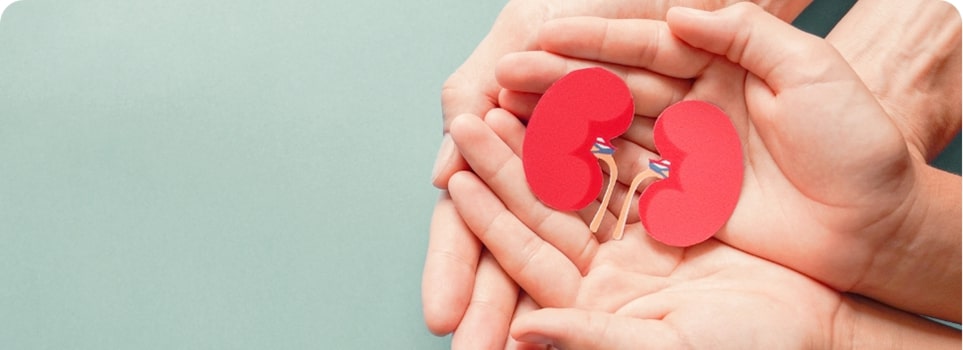What do kidneys do?
Most people have two kidneys, which are a pair of fist-sized organs found towards the back of the abdomen and are either side of the spine. These bean-shaped organs play a vital role in removing waste products from the blood (in the form of urine), controlling fluid balance and maintaining a healthy blood pressure.
In order to remove unwanted products from the bloodstream, the kidneys contain millions of microscopic filtration systems known as nephrons. These nephrons allow excess water and waste to be eliminated from the body, while useful nutrients and minerals are reabsorbed into the bloodstream. This process of filtration happens continuously in healthy kidneys.
In addition to this, the kidneys are important in the production of essential hormones. Some of these hormones are necessary for maintaining bone health and for encouraging bones to produce red blood cells, which are needed to transport oxygen around the body.
Many people are able to lead healthy and active lives with just one functioning kidney. Some may have been born with one kidney, others may have had a kidney removed due to illness or injury. Others may have donated one of their kidneys to someone with kidney failure (in a kidney transplant operation).
What is kidney disease?
Chronic kidney disease (CKD) is a long-term condition in which kidney function declines gradually over time. This means that the kidneys are not able to perform as well as they should. It is important to remember that chronic does not always necessarily mean severe – many cases may involve only mild damage to the kidneys.
There are estimated to be 7.19 million people in the UK currently living with chronic kidney disease, more than 10% of the entire population
There are 93,722 people diagnosed with chronic kidney disease in Wales all at stages 1-5 of illness
How is kidney disease diagnosed?
Most people are diagnosed through individual blood and urine tests carried out by a GP, and often these are routinely carried out for those who are at ‘risk of developing CKD’.
Kidney disease is measured and categorised using a blood test which gauges the eGFR (estimated glomerular filtration rate) and a urine test which shows the ACR (urine albumin:creatinine ratio).
In some cases a scan of the kidneys may be suggested, so that your doctor can get a better understanding of their structure.
The Stages of Kidney Diseases
What is e-GFR Level?
Your doctor uses your blood test results, plus your age, size, gender and ethnic group to calculate how many millilitres of waste your kidneys should be able to filter in a minute. This calculation is known as your estimated glomerular filtration rate (eGFR). Healthy kidneys should be able to filter more than 90ml/min.
Am I at Risk?
CKD can affect patients in different ways, and
so signs and symptoms can vary from person to person.
In fact many people are unaware of it, as they have no signs or symptoms.
Absolutely anyone can get CKD, with it affecting both children and adults. Some people are born with it, whilst others develop it as they get older.
However there are certain factors which can increase the risk of developing CKD, and these are;
- Diabetes
- High blood pressure
- Family history of Kidney Disease
- If you are from a minority ethnic group
- Smoking
- Being overweight or obese
- Cardiovascular disease
What are the Symptoms?
Most people will not show any symptoms of CKD, however some symptoms may show in advanced kidney disease and these may include;
- Swelling (oedema) of the ankles/feet and around
the eyes (because of fluid retention) - Shortness of breath
- Reduced appetite
- Tiredness and feeling weak
- Feeling sick (nausea) and vomiting
- Weight loss
- Itchy skin
- Headache
- Muscle cramps and bone aches
- Difficulty sleeping (insomnia)
- Peeing more frequently at night (nocturia)
Signs are features that your doctor may find on examination – some possible signs of CKD are:
- Darkening of skin
- Skin picking (excoriation) marks
- Change to sensation in limbs (peripheral neuropathy)
- Fluid on the lungs
It is important to remember that everyone is different and so the signs and symptoms of CKD can vary a lot from person to person.
Treatment Types

Dialysis
Dialysis is a medical treatment in which waste products are removed from the blood artificially, effectively taking over the job of the kidneys.

Kidney Transplantation
Kidney transplantation is the other main form that makes up renal replacement therapy for individuals with end-stage kidney disease.